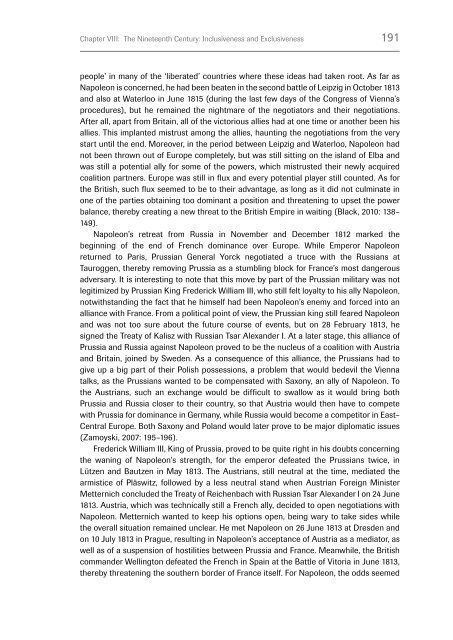Diplomatic Negotiation
Diplomatic_Negotiation_Web_2015
Diplomatic_Negotiation_Web_2015
Create successful ePaper yourself
Turn your PDF publications into a flip-book with our unique Google optimized e-Paper software.
Chapter VIII: The Nineteenth Century: Inclusiveness and Exclusiveness<br />
191<br />
people’ in many of the ‘liberated’ countries where these ideas had taken root. As far as<br />
Napoleon is concerned, he had been beaten in the second battle of Leipzig in October 1813<br />
and also at Waterloo in June 1815 (during the last few days of the Congress of Vienna’s<br />
procedures), but he remained the nightmare of the negotiators and their negotiations.<br />
After all, apart from Britain, all of the victorious allies had at one time or another been his<br />
allies. This implanted mistrust among the allies, haunting the negotiations from the very<br />
start until the end. Moreover, in the period between Leipzig and Waterloo, Napoleon had<br />
not been thrown out of Europe completely, but was still sitting on the island of Elba and<br />
was still a potential ally for some of the powers, which mistrusted their newly acquired<br />
coalition partners. Europe was still in flux and every potential player still counted. As for<br />
the British, such flux seemed to be to their advantage, as long as it did not culminate in<br />
one of the parties obtaining too dominant a position and threatening to upset the power<br />
balance, thereby creating a new threat to the British Empire in waiting (Black, 2010: 138–<br />
149).<br />
Napoleon’s retreat from Russia in November and December 1812 marked the<br />
beginning of the end of French dominance over Europe. While Emperor Napoleon<br />
returned to Paris, Prussian General Yorck negotiated a truce with the Russians at<br />
Tauroggen, thereby removing Prussia as a stumbling block for France’s most dangerous<br />
adversary. It is interesting to note that this move by part of the Prussian military was not<br />
legitimized by Prussian King Frederick William III, who still felt loyalty to his ally Napoleon,<br />
notwithstanding the fact that he himself had been Napoleon’s enemy and forced into an<br />
alliance with France. From a political point of view, the Prussian king still feared Napoleon<br />
and was not too sure about the future course of events, but on 28 February 1813, he<br />
signed the Treaty of Kalisz with Russian Tsar Alexander I. At a later stage, this alliance of<br />
Prussia and Russia against Napoleon proved to be the nucleus of a coalition with Austria<br />
and Britain, joined by Sweden. As a consequence of this alliance, the Prussians had to<br />
give up a big part of their Polish possessions, a problem that would bedevil the Vienna<br />
talks, as the Prussians wanted to be compensated with Saxony, an ally of Napoleon. To<br />
the Austrians, such an exchange would be difficult to swallow as it would bring both<br />
Prussia and Russia closer to their country, so that Austria would then have to compete<br />
with Prussia for dominance in Germany, while Russia would become a competitor in East–<br />
Central Europe. Both Saxony and Poland would later prove to be major diplomatic issues<br />
(Zamoyski, 2007: 195–196).<br />
Frederick William III, King of Prussia, proved to be quite right in his doubts concerning<br />
the waning of Napoleon’s strength, for the emperor defeated the Prussians twice, in<br />
Lützen and Bautzen in May 1813. The Austrians, still neutral at the time, mediated the<br />
armistice of Pläswitz, followed by a less neutral stand when Austrian Foreign Minister<br />
Metternich concluded the Treaty of Reichenbach with Russian Tsar Alexander I on 24 June<br />
1813. Austria, which was technically still a French ally, decided to open negotiations with<br />
Napoleon. Metternich wanted to keep his options open, being wary to take sides while<br />
the overall situation remained unclear. He met Napoleon on 26 June 1813 at Dresden and<br />
on 10 July 1813 in Prague, resulting in Napoleon’s acceptance of Austria as a mediator, as<br />
well as of a suspension of hostilities between Prussia and France. Meanwhile, the British<br />
commander Wellington defeated the French in Spain at the Battle of Vitoria in June 1813,<br />
thereby threatening the southern border of France itself. For Napoleon, the odds seemed


